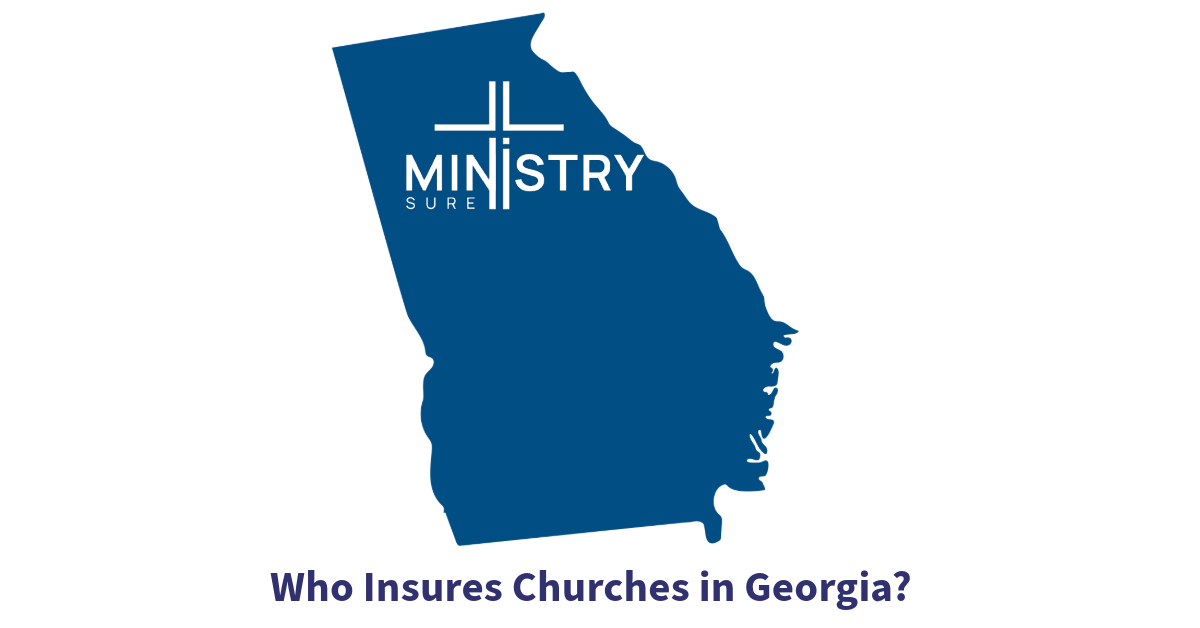In Georgia, a new church called Hope Community Church had just opened its doors. Pastor Rob and his small congregation were excited to start their community services, spiritual growth, and support. The church quickly became a busy place with youth programs, food drives, and more. But as the church grew, Pastor Rob realized they needed to protect their growing community center from potential risks. The need for proper insurance became clear when a storm caused damage to the church’s roof, and a volunteer slipped and fell during a community event. Pastor Rob knew it was time to look into insurance options to keep their mission safe and make sure the church’s future was secure. So, other than “Who Insures Churches in Georgia?”, it’s important to answer some other questions as well.
Why is Insuring Churches Important?
Churches need insurance to protect against unexpected problems. Whether it’s damage from a storm, theft, or someone getting hurt, having the right insurance helps churches keep going without losing too much money. Insurance for churches in Georgia helps make sure the church’s property and activities are safe. Without adequate insurance, churches could face significant financial burdens that could disrupt their operations and limit their ability to serve the community. By having proper insurance, churches can focus on their mission and provide support and services to their members and the wider community without constantly worrying about potential financial setbacks.

Preventing Theft in Churches
Theft can be a big problem for churches. Here’s how to prevent it and make sure you’re covered if it happens.
Security Measures to Consider
There are several security measures that churches can take to reduce the risk of theft and keep the safety of their property.
- Install Security Systems: Cameras, alarms, and motion detectors can scare away thieves and help catch them if they steal something. Modern security systems can also be connected to mobile devices, allowing church leaders to monitor the premises remotely.
- Lighting: Make sure all areas, especially doors and windows, are well-lit. Good lighting can deter potential thieves by increasing the visibility of the property and making it harder for them to operate undetected.
- Regular Checks: Check your security systems regularly to make sure everything is working properly. Regular maintenance of security systems helps to keep your security system operational and effective in deterring theft and other crimes.
Insurance Coverage for Stolen Items
Insurance can help pay for stolen items. Make sure your policy covers theft and protects valuable things like audio-visual equipment, musical instruments, and religious items. It is also important to keep an updated inventory of all valuable items in the church. This inventory should include photos, descriptions, and estimated values. Having a detailed record can expedite the claims process and make certain that the church is adequately compensated in the event of theft.
General Liability Coverage for Churches
General liability insurance is important for protecting churches from claims if someone gets hurt or property gets damaged.
Understanding Liability Risks in Churches
Churches face many liability risks due to their various activities and the people they serve. It’s important to be aware of these risks to manage them effectively.
- Public Events: Churches often have events that attract people, which can lead to accidents. Events such as community fairs, concerts, and fundraisers can draw large crowds, increasing the likelihood of accidents and injuries.
- Counseling Services: Giving advice or counseling can sometimes lead to claims of negligence. Churches that offer counseling services should keep their staff properly trained and aware of best practices to minimize the risk of malpractice claims.
- Volunteers: Volunteers are important, but they can also cause or get hurt in accidents. Churches should provide adequate training and supervision to volunteers to reduce the risk of accidents and injuries.
Importance of General Liability Coverage
General liability insurance helps pay for legal fees, medical bills, and damages if your church is found responsible for an accident. This protection is important for keeping the church financially stable and maintaining its reputation. Without liability coverage, churches could face costly legal battles and significant financial losses that could jeopardize their operations and mission. Having comprehensive liability insurance allows churches to focus on their work without fear of unexpected legal and financial challenges.
Does Your Church Need Insurance?
Deciding if your church needs insurance involves thinking about different factors and understanding legal requirements.
Factors to Consider
When determining the need for church insurance, it’s important to consider several key factors that can influence your decision.
- Size and Activities: Bigger churches with more activities have more risks and need more coverage. Churches that host frequent events, run multiple programs, and have a large congregation are more exposed to potential risks and should maintain adequate coverage.
- Location: Churches in areas with lots of storms or crime need specific types of coverage. The geographic location of the church can significantly impact the types and levels of insurance required. Churches in high-risk areas should consider additional coverage for natural disasters and crime-related incidents.
Legal Requirements for Church Insurance
Not all states require church insurance, but having it can protect against big financial losses and make sure you follow local laws. Some states may have specific insurance requirements for non-profit organizations, including churches. It is important for church leaders to be aware of local regulations and to keep in compliance to avoid legal complications and potential fines.
Types of Insurance Coverages for Churches
Different types of insurance cover different risks. Here are some key coverages your church might need.
Business Owners’ Policy
A Business Owners’ Policy (BOP) combines property and liability insurance into one package, giving good coverage for churches. This type of policy is often cost-effective and provides comprehensive coverage for many of the common risks faced by churches. Learn more about the types of insurance your church needs.
Workers’ Compensation Insurance
If your church has employees, workers’ compensation insurance is needed. It helps cover medical expenses and lost wages if employees get hurt on the job. This type of insurance also provides protection for the church against potential lawsuits related to workplace injuries. Ensuring that employees are covered by workers’ compensation insurance demonstrates the church’s commitment to their well-being and safety.
Directors and Officers Insurance
This insurance protects the church’s leaders from personal liability if they are sued for decisions made for the church. Directors and officers insurance is crucial for safeguarding the personal assets of church leaders and ensuring that they can make decisions confidently without fear of personal financial loss. This coverage is particularly important for churches that engage in complex financial transactions or have significant investments.
Other Insurance Policies for Churches
Besides the basic coverages, there are other policies to think about.
Property Protection
Property insurance covers damage to the church building and its contents from events like fires, storms, and vandalism. Discover what kind of property insurance Christian private schools need. This type of insurance is essential for protecting the physical assets of the church, including buildings, furniture, and equipment. Regularly updating the property insurance policy to reflect any new acquisitions or improvements helps to maintain proper coverage.
Business Interruption Insurance
This helps cover lost income if your church has to close temporarily because of a covered event, so you can keep paying expenses and staff. Business interruption insurance provides financial support to help churches maintain their operations and continue serving their community even during challenging times. This coverage can be particularly beneficial in the aftermath of natural disasters or other significant disruptions that force the church to close temporarily.
Accident Insurance
Accident insurance helps pay for medical expenses an injury occurs to someone on church property or during church activities. This type of insurance provides additional protection for the church and its members, making sure to cover medical expenses in the event of an accident. Accident insurance can also help prevent potential lawsuits by providing immediate financial assistance to injured parties.
How Much Does Church Insurance Cost?
The cost of church insurance depends on several factors.
Factors that Affect the Cost of Church Insurance
There are several factors that can influence the cost of church insurance. Understanding these factors can help you make informed decisions.
- Location: Churches in areas with more risks, like storms, will have higher premiums. The geographic location of the church can significantly impact insurance costs. Churches in high-risk areas should prepare for higher premiums to account for the increased likelihood of claims.
- Size and Activities: Bigger churches with more activities or people will likely pay more for insurance. The size of the congregation and the range of activities offered by the church can affect the overall risk profile, leading to higher insurance costs.
- Coverage Amounts and Types: The more coverage you need, the higher the cost. Churches should carefully assess their insurance needs and ensure they have sufficient coverage to protect against potential risks. Balancing the level of coverage with the cost of premiums is important to ensure financial sustainability.
Average Cost of Church Insurance in Georgia
On average, church insurance in Georgia can range from $500 to $2,000 per year, depending on the church’s size, location, and coverage needs. It’s important to get quotes from multiple providers to find the best coverage at the best price. Working with an experienced insurance agent who specializes in church insurance can help you navigate the options and find a policy that meets your specific needs and budget.
Key Providers of Church Insurance in Georgia
Several insurance companies specialize in providing coverage for churches and religious organizations. Let’s look at some key providers known for their expertise in church insurance:
- Church Mutual Insurance Company: One of the largest and most well-known providers of church insurance, offering a wide range of coverage options tailored to the unique needs of religious organizations.
- GuideOne Insurance: Known for its comprehensive coverage and risk management services tailored to religious organizations. They offer various insurance products designed specifically for churches.
- Brotherhood Mutual Insurance Company: Offers customized insurance solutions for churches, including property, liability, and employee coverage. They dedicate themselves to protecting ministries and supporting their missions.
Be Certain with MinistrySure
Making sure that your church in Georgia has the right insurance coverage is very important for protecting your organization and its mission. MinistrySure commits to helping churches with their insurance needs, providing customized solutions that fit the unique needs of religious organizations. With the right insurance in place, your church can focus on what matters most—serving the community and fulfilling its mission. Contact MinistrySure today to learn more about how we can help protect your church.






